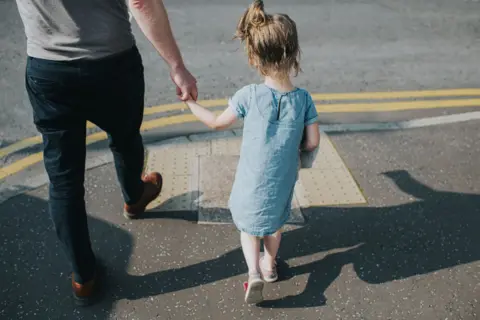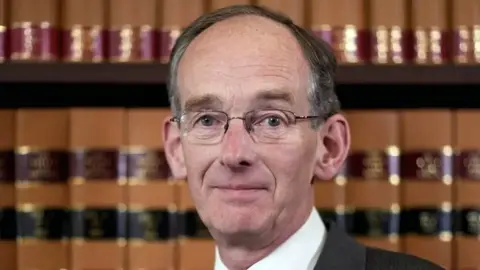Press now allowed to report from family courts
 Getty Images
Getty ImagesJournalists can now report from family courts in England and Wales in what the UK’s most senior family judge has called a “watershed” change.
From Monday, accredited journalists can speak to families about their ongoing cases, report what they see and hear in court, and quote from key documents – provided they keep those families anonymous.
Family courts determine cases that have profound effects on family lives, like deciding whether children should be taken into care or which parent they should live with.
Hearings are held in private, and while journalists have been allowed to attend since 2009 they have had no right to report.
Monday’s change follows a two-year “transparency pilot” which began with three court centres and now covers almost half the family courts in England and Wales.
Using the pilot, the BBC has reported on multiple cases, including one in Cardiff Family Court where a young mother, whom we called Bethan, had to spend £30,000 to protect her young daughter.
Her ex-husband, the child’s father, had been convicted of multiple paedophile offences.
The Family Court agreed he should lose parental rights over the little girl.
Bethan told us she thought the new regime was “fantastic news”. She said “allowing reporting in the Family Court sheds light on issues that the public should have the right to know about”.
Her daughter, she said, was now thriving.
“She has an empathy and sympathy for her little friends that simply couldn’t have developed if she were being brutalised in the way that her father’s victims were. Thanks to the Family Court judgment, she stands a chance at having a full and happy life.”
BBC reporting of Bethan’s case led the then-MP Harriet Harman to campaign to change the law on parental access – which is now under way.
In the future, no other parents in Bethan’s position would have to go to court to remove parental rights from those convicted of the most serious paedophile offences.
The most senior judge in the Family Court, Sir Andrew McFarlane, said Bethan’s case was an example of how the new rules should operate.
“If something isn’t working well, then it should be called out,” he said. The reporting and calling out of such cases was a “healthy development”, he said, adding he “looked forward to more in the future”.
There has been resistance to transparency.
In 2023 a senior family judge in Manchester blocked journalists from reporting a case.
During a private court hearing Judge Haigh made comments about the new approach, which were published when the journalists went to the Court of Appeal.
Judge Haigh said he was not supportive of the “transparency project”.
“I have always felt these cases are deeply private and my judgments are there really for the parents, to help them,” he said. “They are not for public consumption or to allow press and journalists to further their journalistic ambitions.”
In the High Court last year, Mr Justice Williams blocked publication of the names of Family Court judges in the Sara Sharif case – though he did release documents from the case to the press. This was overruled by the Court of Appeal last week, who said judges should be identified whether sitting in private, as they do in family cases, or in public.
Some lawyers also worry the new rules could have “unintended consequences”.
Alexandra Hirst, a solicitor from Boodle Hatfield, a family law firm with offices in Mayfair, and many wealthy clients, expressed concern that individuals would be reluctant to give details of their private lives in court, knowing that reporters would be listening to “highly personal evidence”.
“Regardless of whether publishing names is not permitted, there is a real concern that there will be enough information available to work this out,” she said.
 Royal Courts of Justice
Royal Courts of JusticeSir Andrew said he wasn’t surprised there was resistance to the new approach.
“I understand and respect people would be resistant,” he said. “Change is change”. A lot of the courts originally approached to take part in the pilot, he said, “didn’t greet us with open arms”.
Sir Andrew said when journalists did come to court the judges “were very favourably surprised about how relatively straightforward it is”.
He said reporting had been “significant” and included coverage of issues affecting some of the most vulnerable in society, such as children subject to Deprivation of Liberty Orders and cases of child neglect or abandonment.
He cited the case of Baby Elsa and her siblings as an important story which the BBC had highlighted. In June last year we revealed that Baby Elsa was the third child of the same parents to be abandoned over seven years.
Many newsrooms are under considerable financial pressure, and some have questioned how much reporting of family courts they can undertake.
Dawn Alford, executive director of the Society of Editors said freedom for journalists to report would have a particular value for regional and local audiences.
It was “really vital coverage,” she said, “that is hugely important to the lives of so many” which could help communities “recognise the role of mainstream media”.








